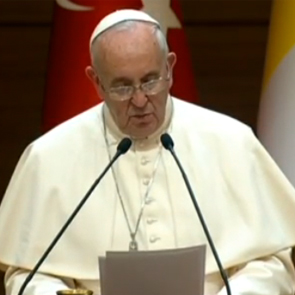Pope Francis made the plight of Christians in the Middle East the focus of the first day of his trip to Turkey, and in a powerful speech this afternoon called on Muslim and Christian leaders to denounce violence for the sake of their shared common traditions which include “the adoration of the All-Merciful God”.
Francis, who this morning landed in the Turkish capital, Ankara, told the President of Religious Affairs Mehmet Görmez, “as religious leaders, we are obliged to denounce all violations against human dignity and human rights.”
He referred to the “especially tragic” situation in Iraq and Syria, two countries that border Turkey, describing the humanitarian situation there as unbearable. In particular he cited the extermination of Christians and Yazidis, which he said was so extreme it sought to eradicate any trace of their existence.
“They have been forcibly evicted from their homes, having to leave behind everything to save their lives and preserve their faith,” he said.
He said that religious leaders had a unique contribution to make and emphasised the common theological ground between Islam and Christianity. Both faiths, he said, “are the bearers of spiritual treasures of inestimable worth”.
Among the faiths’ shared elements are “the adoration of the all-Merciful God, reference to the Patriarch Abraham, prayer, almsgiving, fasting…”, he said.
“Recognising and developing our common spiritual heritage – through interreligious dialogue – helps us to promote and uphold moral values, peace, and freedom in society,” he said. Turkish Muslims and Christians had been exemplary, he added, in their welcome of refugees from elsewhere in the Middle East. The country has taken in some 1.6 millions refugees from Syria and Iraq.
Earlier in the day Francis urged Turkish politicians to work toward religious equality, saying that the country has a great responsibility to promote regional peace.
“How much longer must the Middle East suffer the consequences of this lack of peace?” he asked the assembled civic and political leaders.
Immediately after referring to Turkey’s history from the time of St Paul as “precious to every Christian”, and paying tribute to the “vitality, hard work and generosity” of the Turkish people, he made a heartfelt appeal for dialogue in current religious conflicts – in particular in Iraq and Syria – and universal respect for human dignity and religious freedom.
“Such a dialogue will allow us to reflect sensibly and serenely on our differences, and to learn from them,” he said.
“It is essential that all citizens – Muslim, Jewish and Christian – both in the provision and practice of the law, enjoy the same rights and respect the same duties,” he insisted. “The Middle East, Europe and the world all await this maturing of friendship.”
In Turkey’s neighbours Syria and Iraq, he said, terrorist violence shows no signs of abating and grave persecutions of minorities – Christians and Yazidis in particular – mean that hundreds of thousands have had to flee their homes to survive and to remain faithful to their religious beliefs.
The Pope said it is “licit … to stop an unjust aggressor” but the problem cannot only be solved by a military response.
Turkey has a great responsibility, he said, to promote an “encounter of civilisations” and identify “viable paths of peace and progress”.
Read his full address to political leaders here.




 Loading ...
Loading ...